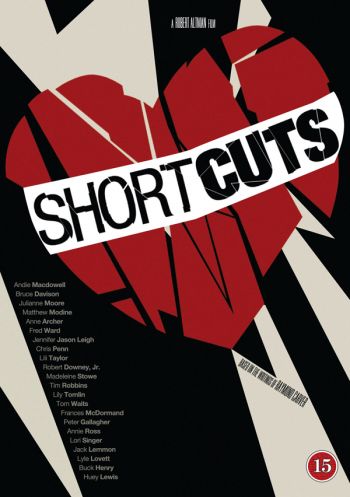What We Talk About When We Talk About Love
 I remember going to see Short Cuts in 1993, the Robert Altman directed film based on the short stories of Raymond Carver. I remember being so shaken by the coldness and hopelessness of the characters that I had to leave the theater for a few minutes, to stand outside and breathe, and try to believe that the real world wasn’t this kind of place.
I remember going to see Short Cuts in 1993, the Robert Altman directed film based on the short stories of Raymond Carver. I remember being so shaken by the coldness and hopelessness of the characters that I had to leave the theater for a few minutes, to stand outside and breathe, and try to believe that the real world wasn’t this kind of place.
A few weeks ago, I heard part of an interview (click the link to go to the site, where you can listen to the interview, if you’re so inclined) on our local NPR station with Molly Ringwald, who has a new book of short stories out that she is promoting. I was intrigued because the interviewer gave her such high praise, and I don’t know him to always be so effusive. He compared her writing to the work of Raymond Carver, which she liked, because she said she really admired Mr. Carver’s work, and especially loved What We Talk About When We Talk About Love. So I picked the book up from the library, not knowing that Short Cuts was based on the short stories of Raymond Carver, two of which are included in this book.
What to say about these stories? I can repeat what I’ve read elsewhere, because it’s true. Mr. Carver says a lot in very few words. You get the feeling, reading his stories, that you’re zooming in on a singular moment in the character’s life, and of course, it’s never a good singular moment. Never the moment when they’re at their best or the world is treating them well. For me, they were so brief, so disquieting and sad, they gave me that same feeling that I had in the movie theater, the feeling of wanting to put the book down for a bit, and breathe. Perhaps this is a better medium for his work. On film, in a theater, you leave and you miss important things. With a book, you can put it down and leave it for a few days. You may miss a bit of the cohesion between the stories, which do seem to build on each other in a pretty interesting way. But at least you can breathe.
6 Comments
Ally Bean
One of the weakest parts of my English Lit education was short stories. We only read novels or poems or plays, but never short stories. Looking back on it, I don’t know why. It’s really kind of a stupid thing.
The result of this is that I forget to even look for a book of short stories when I’m searching for something to read. But no more. I’ll put your two suggestions at the top of my to read list so that [hopefully] I’ll break myself of a bad habit.
J
Ally, I’m not sure that this is the book I’d try if I weren’t a big short story writer. You might, however, adore dipping your toes into the very weird and wonderful world of Aimee Bender, most specifically, Willful Creatures. You can read a review here on this blog if you like. I liked her novels even more, but I’m a novel girl, like you.
If you want to get a little darker and more serious, but not so ‘is humanity truly evil’ like Carver, you might like some Alice Munro. She can write a novel of hope and despair in just a few pages. As can Carver, but I just find his more depressing.
simon
I remember seeing this in the cinema too. Back then I wasn’t so bothered/affected by dark movies as I am now, but even so I remember thinking it was a pretty grim view of humanity.
But I’d like to read some of the stories.
J
Simon, give it a shot! I didn’t LOVE them at all, but he’s a very sparse and precise writer, which is interesting.
Jen
I’m inspired to read some R.C. now. Kind of strange that I never have… I love disquieting stories. Thanks for the idea.
J
Jen, if you love disquieting stories, this is the book for you! Enjoy.